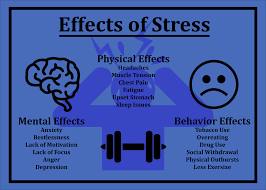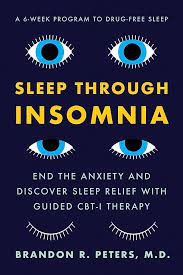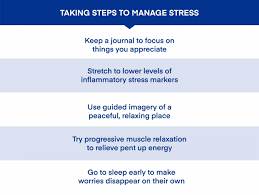Effective Strategies for Managing Stress and Anxiety
Stress and anxiety are common experiences in today’s fast-paced world. While some level of stress can be motivating, chronic stress and anxiety can have detrimental effects on our physical and mental well-being. It’s essential to have effective strategies in place to manage and reduce these feelings.
Identify the Source
The first step in managing stress and anxiety is to identify the source of your feelings. Is it work-related, personal relationships, health issues, or other factors? Understanding what triggers your stress and anxiety can help you develop targeted strategies to address them.
Practice Mindfulness
Mindfulness techniques, such as deep breathing exercises, meditation, and yoga, can help calm your mind and body. By focusing on the present moment and being aware of your thoughts and feelings without judgment, you can reduce stress levels and increase emotional resilience.
Stay Active
Regular physical activity is not only good for your physical health but also plays a crucial role in managing stress and anxiety. Exercise releases endorphins, which are natural mood lifters that can help reduce feelings of stress and improve overall well-being.
Establish Healthy Habits
Prioritize self-care by getting enough sleep, eating a balanced diet, staying hydrated, and avoiding excessive caffeine or alcohol consumption. Taking care of your physical health can have a positive impact on your mental health and resilience against stressors.
Seek Support
Don’t hesitate to reach out for support from friends, family members, or mental health professionals if you’re feeling overwhelmed by stress and anxiety. Talking about your feelings with someone you trust or seeking professional guidance can provide valuable insights and coping strategies.
Conclusion
Managing stress and anxiety is an ongoing process that requires self-awareness, proactive steps, and a willingness to seek help when needed. By incorporating these effective strategies into your daily routine, you can better cope with life’s challenges and improve your overall well-being.
8 Key Benefits of Effectively Managing Stress and Anxiety: From Well-Being to Resilience
- Improved overall well-being
- Enhanced emotional resilience
- Better coping mechanisms for challenges
- Increased self-awareness
- Boosted mental clarity and focus
- Enhanced relationships with others
- Reduced risk of health issues related to stress
- Greater sense of control over one’s life
Five Challenges of Managing Stress and Anxiety: Time, Individual Differences, Work-Life Balance, Financial Costs, and the Pitfalls of Temporary Fixes
- Managing stress and anxiety can be time-consuming, requiring consistent effort and dedication.
- Some coping mechanisms for stress may not work for everyone, leading to frustration and discouragement.
- It can be challenging to maintain a healthy work-life balance while focusing on stress management.
- Seeking professional help for managing stress and anxiety may involve financial costs that are not always affordable.
- Over-reliance on temporary solutions like medication or substance abuse can mask underlying issues without addressing them effectively.
Improved overall well-being
One significant benefit of effectively managing stress and anxiety is the improvement in overall well-being. By implementing strategies to reduce stress levels and cope with anxious feelings, individuals can experience a positive impact on their physical, mental, and emotional health. Improved overall well-being often translates to increased energy levels, better sleep quality, enhanced mood, and a greater sense of inner peace. When stress and anxiety are managed effectively, individuals are better equipped to navigate life’s challenges with resilience and maintain a higher quality of life.
Enhanced emotional resilience
Enhanced emotional resilience is a significant benefit of effectively managing stress and anxiety. By developing coping mechanisms and strategies to deal with challenging situations, individuals can build a stronger capacity to bounce back from adversity. This increased resilience not only helps in navigating daily stressors but also equips individuals to face larger setbacks with greater composure and adaptability. By fostering emotional resilience through stress management techniques, individuals can cultivate a more positive outlook, improved problem-solving skills, and a greater sense of control over their emotions and reactions.
Better coping mechanisms for challenges
One significant benefit of effectively managing stress and anxiety is the development of better coping mechanisms for challenges. By learning how to navigate and reduce feelings of stress and anxiety, individuals can build resilience and adaptability in the face of difficult situations. This enhanced ability to cope with challenges allows individuals to approach obstacles with a clearer mind, make more rational decisions, and maintain a sense of control over their emotions and reactions. Ultimately, mastering coping mechanisms through stress and anxiety management empowers individuals to face adversity with confidence and composure.
Increased self-awareness
Increased self-awareness is a significant benefit of effectively managing stress and anxiety. By developing a deeper understanding of our thoughts, emotions, and triggers, we can better navigate challenging situations and make more conscious choices. Self-awareness allows us to recognize patterns of behavior, identify areas for personal growth, and cultivate a greater sense of control over our responses to stressors. Ultimately, this heightened self-awareness empowers us to proactively address sources of stress and anxiety, leading to improved emotional resilience and overall well-being.
Boosted mental clarity and focus
One significant benefit of effectively managing stress and anxiety is the boosted mental clarity and focus that accompanies a calmer state of mind. When we reduce the burden of stress and anxiety, our cognitive abilities improve, allowing us to think more clearly, make better decisions, and concentrate on tasks with heightened focus. By cultivating a sense of inner peace through stress management techniques, we can enhance our mental acuity and productivity in both personal and professional endeavors.
Enhanced relationships with others
Managing stress and anxiety can lead to enhanced relationships with others. When we are in a calmer and more balanced state of mind, we are better able to communicate effectively, show empathy, and be present for those around us. By reducing our own stress levels, we can approach interactions with a sense of clarity and understanding, fostering stronger connections and deeper bonds with friends, family, colleagues, and partners. Improved emotional regulation resulting from effective stress management can create a positive ripple effect on our relationships, leading to greater harmony and mutual support in our interactions with others.
Reduced risk of health issues related to stress
One significant benefit of effectively managing stress and anxiety is the reduced risk of health issues associated with chronic stress. High levels of stress have been linked to a variety of health problems, including heart disease, high blood pressure, weakened immune system, digestive issues, and mental health disorders. By implementing strategies to cope with stress and anxiety, such as mindfulness practices, regular exercise, and seeking support when needed, individuals can lower their susceptibility to these detrimental health conditions and promote overall well-being.
Greater sense of control over one’s life
One significant benefit of effectively managing stress and anxiety is experiencing a greater sense of control over one’s life. By implementing strategies to reduce stress levels and address anxious thoughts, individuals can regain a feeling of empowerment and agency in how they navigate daily challenges. This increased sense of control not only enhances mental well-being but also fosters resilience in facing future stressors with confidence and composure. Taking proactive steps to manage stress and anxiety empowers individuals to steer their lives in a direction aligned with their values and goals, leading to a more fulfilling and balanced existence.
Managing stress and anxiety can be time-consuming, requiring consistent effort and dedication.
One significant con of managing stress and anxiety is the time and effort it demands. Consistently addressing and alleviating stress and anxiety requires a dedicated commitment to implementing coping strategies, practicing self-care, and seeking support when needed. This ongoing process can be time-consuming, potentially adding to an individual’s daily responsibilities and routines. The need for consistent effort and dedication to managing stress and anxiety may present challenges in maintaining a balance between addressing mental well-being and other aspects of life.
Some coping mechanisms for stress may not work for everyone, leading to frustration and discouragement.
It is important to recognize that not all coping mechanisms for managing stress and anxiety will be effective for everyone. What works well for one person may not necessarily work for another, leading to feelings of frustration and discouragement. This con highlights the need for individuals to explore and experiment with different strategies to find what best suits their unique needs and circumstances. It’s essential to approach stress management with an open mind, willingness to adapt, and seek guidance from professionals if needed to discover personalized coping mechanisms that can effectively alleviate stress and anxiety.
It can be challenging to maintain a healthy work-life balance while focusing on stress management.
Balancing the demands of work and personal life while prioritizing stress management can present a significant challenge. The pressure to excel in one’s career, meet deadlines, and handle responsibilities at home can often lead to neglecting self-care practices that are essential for managing stress and anxiety effectively. Striking a balance between professional obligations and personal well-being requires conscious effort, boundary-setting, and the willingness to prioritize mental health amidst the daily hustle and bustle. Failure to address this con can result in burnout, strained relationships, and overall diminished quality of life.
Seeking professional help for managing stress and anxiety may involve financial costs that are not always affordable.
One significant drawback of seeking professional help for managing stress and anxiety is the potential financial burden it can place on individuals. Therapy sessions, counseling services, and mental health treatments often come with associated costs that may not always be affordable for everyone. This financial barrier can prevent individuals from accessing the support they need to effectively manage their stress and anxiety, leading to prolonged suffering and potentially exacerbating their mental health conditions. The lack of affordable options for professional help can create disparities in access to quality mental health care, highlighting the need for more accessible and affordable resources for those struggling with stress and anxiety.
Over-reliance on temporary solutions like medication or substance abuse can mask underlying issues without addressing them effectively.
An important con of managing stress and anxiety is the tendency to rely too heavily on temporary solutions, such as medication or substance abuse. While these methods may provide immediate relief, they often only mask the symptoms of stress and anxiety without addressing the underlying issues effectively. Over time, this can lead to a cycle of dependency and potential long-term negative consequences on both physical and mental health. It’s crucial to seek sustainable coping strategies that address the root causes of stress and anxiety to promote lasting well-being and resilience.



